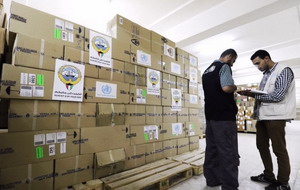 Cairo, Egypt, 26 July 2018 — WHO welcomes the generous support of the State of Kuwait through a US$ 59 million contribution to help the people of Yemen obtain greater medical assistance, particularly the most vulnerable — women, children, the injured and people with special needs.
Cairo, Egypt, 26 July 2018 — WHO welcomes the generous support of the State of Kuwait through a US$ 59 million contribution to help the people of Yemen obtain greater medical assistance, particularly the most vulnerable — women, children, the injured and people with special needs.
“Kuwait funding will provide urgent health assistance to more than 16.4 million people, including chronically ill people, pregnant and breastfeeding mothers, severely malnourished children, injured patients and internally displaced people,” said WHO Regional Director for the Eastern Mediterranean Dr Ahmed Al-Mandhari.
The contribution will allow WHO to provide vulnerable people with access to essential health services close to where they live, including for general services and trauma; child and nutrition care; reproductive, maternal and newborn care; mental health; communicable diseases; and life threatening noncommunicable diseases.
With conflict continuing in Al Hudaydah, WHO is urgently procuring and transferring emergency medical supplies and medicines to Sana’a by air and to Al Hudaydah by ship. This is critical as supplies of medicines and other health supplies in country are extremely limited and desperately needed.
“We will continue working with WHO to address the urgent health needs of our sisters and brothers in Yemen,” said H.E. Ambassador Jamal Al-Ghunaim, Permanent Representative of the State of Kuwait to the United Nations Office and other International Organizations in Geneva.
Kuwait has provided high quality and flexible funding of nearly US$ 140 million in support of WHO’s emergency operations over the last 5 years.
“As one of the world’s largest humanitarian donors, Kuwait has made substantial annual contributions to address the crises in the Middle East and other regions in need of assistance”. added WHO Regional Director for the Eastern Mediterranean Dr Ahmed Al-Mandhari.
WHO 2017 achievements in Yemen
1500 tonnes of medicines and supplies delivered
76 million litres of clean water provided to more than 100 health facilities
4.4 million litres of fuel provided for health facility generators and ambulances
49 health cluster partners coordinated as part of emergency response
13 emergency mobile medical teams in 3 governorates
43 fixed health teams in 13 governorates
41 surgical teams in 14 conflict-affected governorates
20 therapeutic feeding centres in 10 priority governorates


